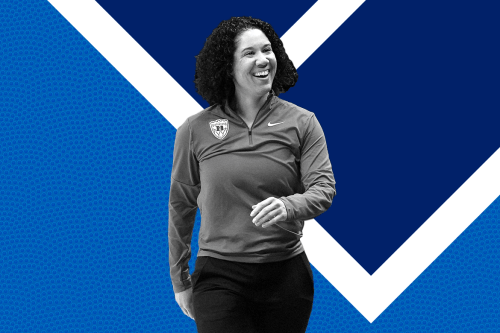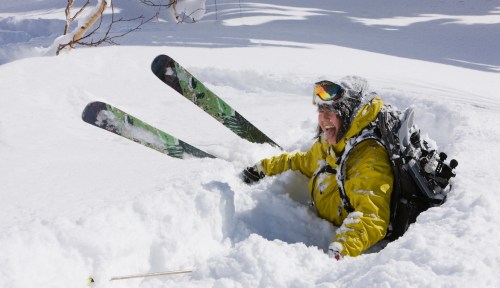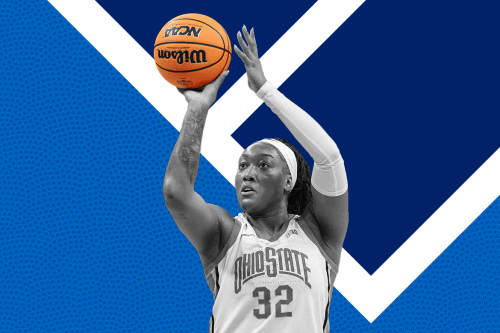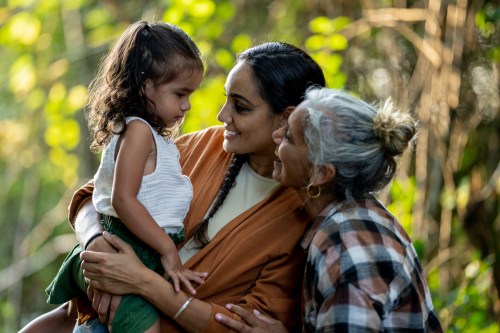Whether you’re a powder hound searching for that next killer bluebird day, or you identify more as a sit-by-the-fire after a run or two kind of skier, hitting the slopes is an exhilarating way to spend a winter day. Bonus points: It doesn’t hurt that heading to the top of a snowy mountain can bring some of the most stunning views in the world (looking at you, Teton Mountain Range.)
Experts in This Article
But no matter if you’re a newbie or a seasoned pro, it’s pretty common to wipe out while you’re cruising down the slopes. And getting back up can be super awkward and challenging.
We caught up with Janalee Grover, professional certified ski and snowboard instructor at Grand Targhee Resort in Alta, Wyoming, who has been teaching snow sports for 15 years. Every season, she averages 140 days on the mountain getting her turns in—occasional falls included.
Grover teaches all types of skiers and snowboarders daily, and has plenty of experience helping them get back upright after a tumble. “In both skiing and snowboarding, you are aligning your center of mass, or your center of balance, along the center of the board or skis,” she says. “You are focused on keeping an athletic position, while also staying relaxed enough to allow your legs and lower body to flex and move—you can’t stay stiff!”
First: Assess, and then reposition yourself
When you fall, always do a self-assessment to see where your body is at. Are you hurt? Can you make it down the hill? If not, look for help, and have someone find the nearest Ski Patrol member.
If you’re good to go, reorient your skis or board so they are below you and at a 90-degree angle to the bottom of the hill, or laying horizontally across the slope. “When you stand up, you don’t want to slide downhill,” Grover explains.
Get small to get up
If you’re on skis, Grover says to pull your knees closer to your chest and place both hands beside your body and work them to the front, like you were going to give your knees a hug.
Gold Medal Couple Tara Davis-Woodhall and Hunter Woodhall Talk Marriage, Motivation, and Their Next Chapter With Nike

Coach Kara Lawson Wants You to ‘Handle Hard Better’—and Here Are 3 Ways to Do Just That

JuJu Watkins Leaves March Madness With ACL Tear—and This Knee Injury Is More Common Than You Think

“So many people try to reach behind them and do a back bend by pushing themselves up,” she says. But with that strategy, you often just sink in the snow, and you can also put too much strain on your back.
The goal is to get your hands in front of you. “It is all about getting the entire body closer to the front of the skis to stand up,” she says. “Tighten your core and focus on your core strength here, almost like a crunch, then pump it.” Voila! You’re up!
If it’s just not working…
Another option is always to take off your uphill ski. This way, “you have the capability of kneeling on your uphill foot, then standing up and strapping back into your gear,” Grover says.
On a snowboard, get into toe-side position
Snowboarding is a bit easier post-fall. The same rules apply for realigning your snowboard at a 90-degree angle to the bottom of the hill. Grover then tells her students to get into in a “toe-side position.” If you’re not up with the snowboard jargon, toe side refers to balancing on your snowboard with the front edge of the board dug into the snow and your body facing uphill. (Heel side is the opposite: Your heels are dug into the snow with the back edge of your snowboard and your body is facing downhill.)
With your body facing uphill while kneeling in the snow, push up by straightening your legs and bracing your core until you get your balance back on the snowboard.
Don’t be embarrassed
Although they can be disorienting, tumbles are something to embrace. “Falling is part of learning and there is a way you can fall and fall safely, and then stand back up and start all over again,” Grover says.
If you are just starting out, find a ski resort like Grover’s home mountain that’s known for light, fluffy snow that makes falling a little bit more enjoyable. While you’re at it, book a lesson with the pros ready to teach you how it’s done.
Sign Up for Our Daily Newsletter
Get all the latest in wellness, trends, food, fitness, beauty, and more delivered right to your inbox.
Got it, you've been added to our email list.








